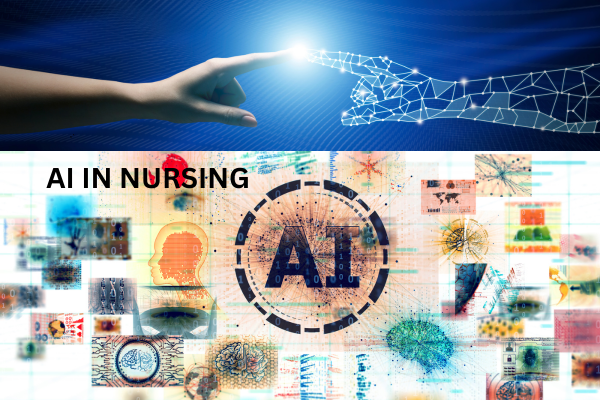AI and Nursing: How Smart Technology Is Changing the Healthcare Industry
The nursing profession has long been at the forefront of healthcare, offering patients vital support and caring care. However, as technology develops, nurses’ roles are changing in fascinating and revolutionary ways. Artificial intelligence (AI) and robotics are not just sci-fi ideas; they are here and are changing the way nurses operate, enhancing patient outcomes, and reducing some of the difficulties the field encounters. Let’s examine the effects of these advancements in more detail.
- Automating Daily Activities to Increase Patient Care Time
The sheer amount of repetitive, time-consuming work that nurses must do is one of their greatest obstacles. Although necessary, tasks like administering medication and keeping an eye on vital signs might interfere with nurses’ ability to provide direct patient care. AI and robotics can help with this. These days, routine jobs like delivering supplies, moving test samples, and even cleaning hospital rooms are being handled by robots. Robotic carts, for instance, can distribute drugs across hospital hallways, and cleaning robots employ UV light to swiftly and effectively sterilize areas. Nurses can concentrate more on what they do best—giving patients emotional support and hands-on care—by automating these duties.

- Using AI to Improve Patient Monitoring
Nurses’ patient monitoring is being revolutionized by AI-powered gadgets. Vital indicators including blood pressure, oxygen saturation, and heart rate can be continuously monitored using wearable technology and smart sensors. Faster interventions are made possible by these systems’ use of AI to evaluate data and notify nurses if something seems strange. AI systems, for example, can forecast a patient’s risk of problems like sepsis or falling out of bed. By taking a proactive stance, nurses are better able to focus their attention and give care before an emergency arises. It ensures that no detail is overlooked, almost like having an additional pair of eyes and ears. - Assisting with Clinical Decision-Making Because nurses frequently manage several patients with intricate demands, prompt and precise decision-making is essential. AI is helping by offering insights and recommendations that are supported by evidence. AI systems, for instance, can recommend possible diagnosis or treatment strategies by analyzing patient data, medical histories, and present symptoms. This complements the nurse’s competence rather than taking its place. These AI-powered insights can help nurses make better judgments, which lowers the possibility of mistakes and enhances patient outcomes. It’s similar like having a reliable helper who is always willing to lend a hand.
- Using Robotic Help to Reduce Physical Strain
The nursing profession is physically taxing. Standing for extended periods of time, lifting patients, and helping them move around can all be physically taxing. In order to aid nurses with these physically demanding activities, assistive technologies and robotic exoskeletons are being created. Robotic lifting equipment, for instance, can transport patients from beds to wheelchairs safely, lowering the possibility of accidents for both patients and nurses. These developments guarantee that patients receive safer, more comfortable treatment in addition to safeguarding the health of nurses. - Dealing with the Lack of Nurses
With many healthcare systems finding it difficult to satisfy demand, the worldwide nursing shortage is a serious problem. By sharing some of the workload and assisting nurses in their duties, robotics and artificial intelligence are assisting in closing this gap. These technologies can relieve some of the strain, enabling nurses to care for more patients without experiencing burnout, even though they cannot completely replace the human touch. The next generation of nurses is also being educated with the use of AI-powered training resources. For example, nursing students can hone their abilities and confidence before entering the industry by practicing complex operations in a safe, controlled setting through virtual reality (VR) simulations. - Human Touch Is Still Important
Nursing is changing due to robotics and artificial intelligence, but it’s crucial to keep in mind that these technologies are only tools, not substitutes. Machines cannot replace the human connection, empathy, and compassion that are at the heart of nursing. Technology cannot replace the particular understanding of patients’ emotional and psychological requirements that nurses bring to the table. Rather, these improvements are designed to help nurses by simplifying and streamlining their work so they can concentrate on what really counts: providing patient care. - Ethical Issues and Difficulties
Although there is no denying the advantages of robotics and artificial intelligence in nursing, there are also significant ethical concerns with its incorporation. How, for example, can we protect patient privacy when utilizing AI systems that gather and examine enormous volumes of private health data? And even if the objective is to help nurses rather than replace them, how do we handle worries about job displacement? Openness is essential. Clear rules for the ethical use of these tools must be established in collaboration with nurses, healthcare professionals, and technology developers. Patients should also have the option to opt out if they feel uncomfortable and be told how their data is being used. We can foster trust and guarantee that technology is used properly by nurses and patients by tackling these issues head-on. - Overcoming the Digital Gap
Not every healthcare facility has the funds to implement cutting-edge AI and robotics technology. The quick speed of technology advancement may be too much for smaller clinics or hospitals in underprivileged areas to handle. A digital divide might result from this, with some patients receiving state-of-the-art care while others are left behind. Governments, nonprofit organizations, and private businesses must work together on projects that increase access to these technologies in order to stop this. Smaller hospitals can incorporate robotics and AI into their operations with the support of grants, subsidies, and training initiatives, guaranteeing that all patients, regardless of where they reside, have access to high-quality care. - Nurses’ Contribution to the Future
Nurses are actively involved in influencing the direction of healthcare, not merely passive consumers of these technology advancements. When it comes to creating robotic systems and AI technologies that genuinely satisfy the demands of patients and healthcare professionals, their first-hand knowledge and insights are crucial. For instance, nurses might offer suggestions for enhancements to robotic devices or offer input on the application of AI algorithms in clinical settings. We can develop solutions that are useful, easy to use, and in line with healthcare reality by include nurses in the development process. - Making Future Plans
Continued education and training will be crucial as robotics and artificial intelligence are used into nursing more and more. Nurses must become proficient in the use of these new tools and comprehend both their advantages and disadvantages. While it is not necessary for every nurse to become an expert in technology, it will be essential to have a fundamental understanding of how these systems operate. Training programs that assist nurses in adjusting to these changes should be funded by healthcare institutions. Nurses can be empowered to embrace technology with confidence and apply it to improve their practice through workshops, online courses, and practical simulations. - A Future of Collaboration
Collaboration, not a choice between humans and machines, is the way of the future in nursing. Imagine a future in which AI systems offer real-time insights to direct patient care, and nurses collaborate with robots to administer medications. Nurses now have more time to sit with patients, hear their worries, and offer the human-only emotional support that they need. This cooperative strategy could revolutionize healthcare by increasing its efficacy, efficiency, and compassion. In this future, technology enhances rather than replaces the human element. - Concluding remarks
Unquestionably, robotics and artificial intelligence are transforming the nursing profession, but they are not meant to replace nurses; rather, they are meant to assist them. These technologies help nurses focus on what they do best—care for people—by automating repetitive chores, improving patient monitoring, and offering insightful data. It’s critical that we approach these changes carefully going forward, addressing ethical issues and making sure that all healthcare facilities can take advantage of these developments. The core of healthcare will remain nurses, and given the correct resources, they will be more capable than ever of improving their patients’ lives.


3 thoughts on “AI and Nursing: How Smart Technology Is Changing the Healthcare Industry”